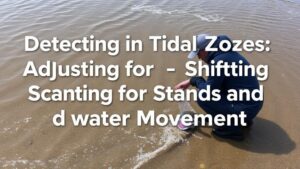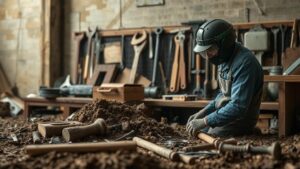Detecting for Coins in Piers and Docks of Old Fishing Villages
Detecting for Coins in Piers and Docks of Old Fishing Villages
Coin detecting in the piers and docks of old fishing villages offers a remarkable intersection of historical research, archaeology, and recreational treasure hunting. These locations, often teeming with both documented and undocumented history, serve as fertile ground for collectors, historians, and metal detecting enthusiasts alike. In this article, we will explore the strategies, tools, and historical contexts necessary to be successful in this intriguing activity.
The Historical Significance of Old Fishing Villages
Old fishing villages often date back centuries and were crucial to local economies. served as centers for trade, social interaction, and cultural exchange. As a result, pier and dock areas frequently experienced heavy foot traffic, making them prime locations for lost or discarded items, particularly coins.
For example, in the village of Aysgarth in Yorkshire, England, the surrounding area is rich with artifacts that date as far back as the 14th century, including coins from various eras. The discovery of such items can significantly enhance our understanding of local history and trade routes.
Essential Equipment for Coin Detecting
A successful coin detecting expedition requires the right equipment. following is a list of essential tools:
- Metal Detector: A high-quality metal detector, preferably one designed for beach and underwater use, can discern different metal types and depths.
- Digging Tools: A trowel or digging shovel helps locate coins without damaging them.
- Pinpointer: A handheld metal detector for precise location of the target object.
- Finders Gloves: Protects hands while digging and handling found objects.
- Notebook and Camera: Recording discoveries and taking photographs can aid in documentation and future research.
Techniques for Successful Coin Detection
Effective techniques include understanding the types of coins likely to be found, knowing optimal times for exploration, and utilizing specific search patterns. Here are some strategies:
- Researching Historical Context: Familiarize yourself with local history through archives or libraries to understand what types of coins may be found.
- Timing Your Discoveries: Late spring and early summer after storms can reveal washed-up items, including coins.
- Pattern Searching: Use a systematic grid pattern when scanning the area to ensure full coverage.
Case Studies: Successful Finds
Several well-documented cases illustrate the potential for remarkable finds in these locations. One notable instance occurred in the coastal town of St. Ives, Cornwall, where a metal detecting enthusiast uncovered a hoard of Medieval coins dating from the 13th century. This discovery not only contributed to the villages historical narrative but also attracted increased tourism and interest in local heritage.
In another example, a group of hobbyists on a shoreline in Maine found numerous coins from the late 1800s, including rare silver pieces. This find prompted local historians to revise their understanding of the fishing villages trading practices during that period.
Legal and Ethical Considerations
Before embarking on a coin detecting expedition, it is imperative to consider legal and ethical guidelines. Many countries have specific regulations regarding the discovery and ownership of historical artifacts. Also to governmental rules, the treasure hunting community adheres to a code of ethics, which encourages:
- Obtaining permission to search on private property.
- Reporting significant finds to local historians or archaeologists.
- Restoring the area to its original condition after detecting.
Actionable Takeaways
Engaging in coin detecting in the piers and docks of old fishing villages can be profoundly rewarding. Here are some actionable steps to start your adventure:
- Research local fishing villages for historical significance.
- Invest in quality detecting equipment tailored for your environment.
- Join local clubs or online forums to share experiences and gather tips from fellow enthusiasts.
- Stay informed about legal guidelines and community ethics regarding treasure hunting.
With thoughtful preparation and an ethical approach, detecting for coins in historical piers and docks can lead not only to personal satisfaction but also to valuable contributions to our understanding of local history.



